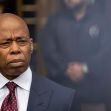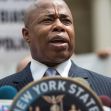On Tuesday, U.S. Senator Bob Menendez was found guilty on all 16 criminal charges against him, including bribery. The verdict was reached in a federal court in Manhattan after a trial that spanned nine weeks and three days of jury deliberation.
Despite the verdict, Menendez, who has been a Senator since 2006 and escaped conviction in a 2017 corruption trial due to a hung jury, insisted on his innocence and announced plans to appeal.
"I have never violated my public oath," Menendez declared outside the courthouse. "I have never been anything but a patriot of my country and for my country."
The trial revolved around multiple bribery schemes in which prosecutors claimed Menendez and his wife, Nadine Menendez, received substantial bribes, including cash, gold bars, and payments for a car and mortgage. These bribes were allegedly given in return for Menendez’s influence in steering U.S. aid to Egypt and intervening in criminal investigations on behalf of three businessmen.
The federal statutes at the heart of U.S. Senator Bob Menendez's corruption case encompass a range of criminal activities, including bribery, conspiracy, and obstruction of justice. The key statutes are outlined below:
1. Bribery (18 U.S. Code § 201): This statute criminalizes the act of giving or receiving anything of value with the intent to influence the actions of a public official. In Menendez's case, prosecutors argued that he and his wife received cash, gold bars, and other valuable items from businessmen in exchange for political favors. The statute covers both the offering and accepting of bribes, making it a crucial element in the charges against Menendez.
2. Conspiracy to Commit Offense or to Defraud the United States (18 U.S. Code § 371): Under this statute, it is illegal for two or more persons to conspire either to commit any offense against the United States or to defraud the United States. The prosecution alleged that Menendez conspired with his co-defendants to defraud the U.S. government by using his office to benefit his benefactors, thus violating his duty to act impartially on behalf of the public interest.
3. Obstruction of Justice (18 U.S. Code § 1503): This statute prohibits any endeavor to influence, obstruct, or impede the due administration of justice. Menendez was accused of attempting to obstruct investigations and criminal probes into his associates. This includes alleged efforts to influence law enforcement officials to drop or lessen investigations into the businessmen who provided him with bribes.
4. Wire Fraud (18 U.S. Code § 1343): Wire fraud involves using electronic communications or transactions to defraud someone of money or property. The indictment included charges of wire fraud against Menendez, asserting that he used phone calls, emails, and other forms of electronic communication to further his corrupt activities and schemes.
5. Acting as an Agent of a Foreign Government Without Notification (18 U.S. Code § 951): This statute requires anyone acting as an agent of a foreign government to notify the Attorney General. Menendez was accused of acting on behalf of the Egyptian government by steering U.S. foreign aid to Egypt in return for bribes. This allegation underscores the seriousness of the charges, linking them not just to domestic corruption but to international intrigue as well.
These statutes collectively form the legal basis for the charges against Menendez, reflecting the nature of the alleged corruption and the broad scope of his purported illegal activities.
U.S. Attorney Damian Williams stated, "This verdict marks the end of Senator Menendez's practice of using his public office for personal gain."
Menendez showed little reaction as the jury's decision was read. Co-defendants Wael Hana and Fred Daibes were also convicted, while the third businessman involved, Jose Uribe, had already pled guilty and testified for the prosecution.
U.S. District Judge Sidney Stein scheduled Menendez's sentencing for October 29, just days before the November 5 election, where Menendez is running for re-election as an independent.
New Jersey Governor Phil Murphy, a Democrat, suggested that if Menendez does not resign, the Senate should vote to expel him. If Menendez steps down, Murphy would appoint his replacement.
Senator Booker remarked, "This verdict is a dark day for the people of New Jersey. Trust in public officials is paramount, and when that trust is breached, it undermines the foundation of our democracy."
Menendez has been an influential figure in Washington for over 30 years, serving New Jersey in the Senate since 2006. Prior to that, he served in the U.S. House of Representatives and the New Jersey state legislature. He was a pivotal ally in President Biden’s efforts to bolster U.S. foreign policy, particularly in supporting Ukraine and countering China.
Jurors reviewed evidence, including gold bars and over $480,000 in cash seized from the Menendezes' home. Prosecutors detailed how Hana arranged a $10,000 monthly "sham job" for Nadine Menendez, prompting Senator Menendez to influence the U.S. Agriculture Department’s oversight of Hana’s company.
The trial also revealed that Menendez pressured law enforcement to ease off on Daibes and Uribe, the latter testifying that he bought Nadine Menendez a $60,000 Mercedes-Benz in exchange for her husband's assistance.
Nadine Menendez, facing separate charges, was absent from the trial due to a breast cancer diagnosis.






